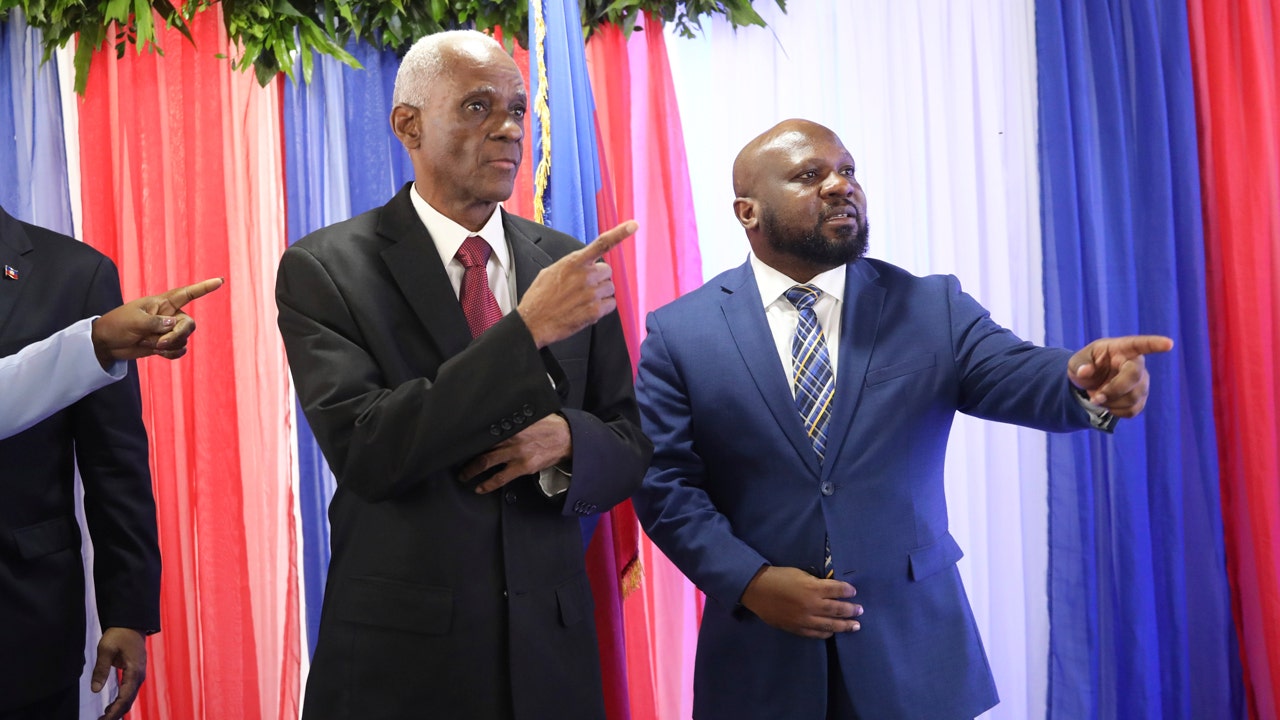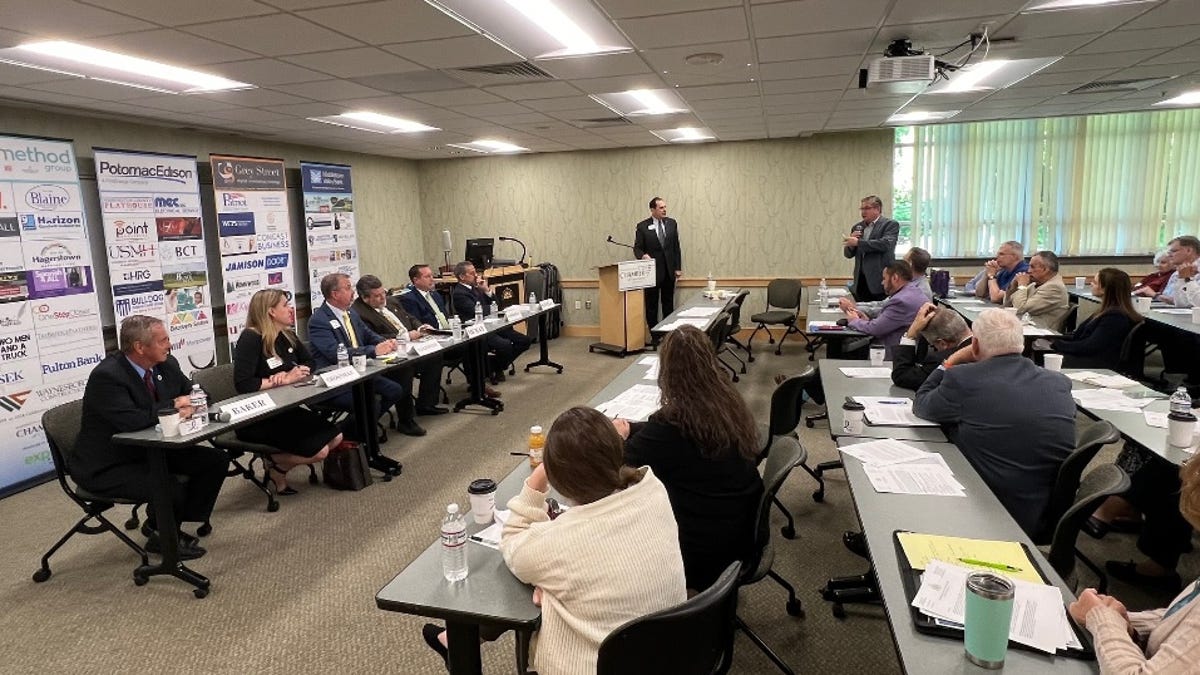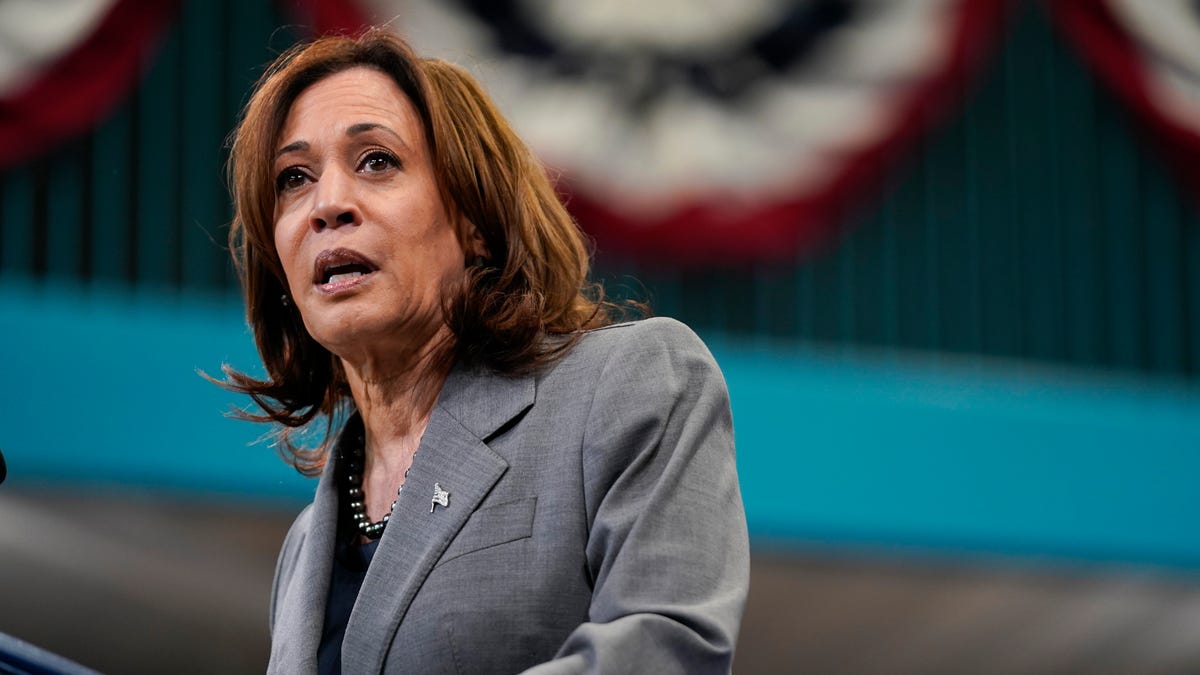World
Trump attends New York court for defamation trial

Writer E Jean Carroll is accusing the former US president of defaming her in 2019 by denying he had attacked her in a department store dressing room.
Former US President Donald Trump has arrived in a New York courtroom to defend himself for a second time against charges that he defamed writer E Jean Carroll after she accused him of rape.
Trump, who has said he wants to testify at the civil trial, sat two tables behind Carroll, who is accusing him of defaming her in 2019 by denying he had attacked her in a Bergdorf Goodman department store dressing room in Manhattan.
Carroll, 80, is seeking at least $10m in damages.
US District Judge Lewis Kaplan, who is overseeing the case, told prospective jurors on Tuesday that they would only have to consider how much Trump should pay Carroll in damages, not whether the alleged assault took place or whether Trump lied about it.
He added that the trial is expected to last three to five days.
Trump has cast himself as the victim of political persecution and said Kaplan should dismiss the case.
“Judge Kaplan should put this whole corrupt, Crooked Joe Biden-directed Election Interference attack on me immediately to rest,” he said on social media.
“He should do it for america.”
Trump has so far pleaded not guilty in four criminal cases that could potentially land him in prison before the November presidential election, including two that accuse him of trying to overturn the results of the 2020 election.
He is also the defendant in at least two other civil cases. But Trump has already lost one defamation case against Carroll.
In May last year, a jury ordered Trump to pay the former Elle columnist $5m for having sexually abused her during the encounter and defaming her.
Trump has said that he did not know Carroll and that she made up the encounter to sell her memoir. He is also appealing the $5m award.
Kaplan, who also presided over that case, said he has barred Trump from arguing that he did not defame or sexually assault Carroll or that she made up her account.
In recent weeks, Trump has ramped up his attacks on Carroll, including saying she did not know the decade of their encounter.
He also called Kaplan “terrible, biased, irrationally angry”.
Trump may face an uphill fight to escape significant additional damages because of Kaplan’s pre-trial rulings.
These include banning Trump from suggesting he did not rape Carroll, as New York’s penal law defines the term, because the first jury did not find that Trump committed rape.
Kaplan has ruled that because Trump used his fingers in the assault, Carroll’s rape claim was “substantially true.”
Trump also cannot discuss DNA evidence or Carroll’s sexual activities, or suggest that Democrats are bankrolling her case. Carroll is a Democrat.
And as happened at the first trial, jurors will be able to see the 2005 video from Access Hollywood video where Trump graphically described the ability of famous people like himself to have sexual relations with beautiful women.
Trump did not retract his comments when asked about them in a 2022 deposition. Kaplan has said the video could offer “useful insight into Mr. Trump’s state of mind” toward Carroll.
Trump lawyer Alina Habba on Sunday assured Kaplan that he was “well aware” of the court’s rulings “and the strict confines placed on his testimony”.

World
Blinken says US cannot support Rafah assault without humanitarian plan

World
The unexpected announcement of a prime minister divides Haiti's newly created transitional council

A surprise announcement that revealed Haiti’s new prime minister is threatening to fracture a recently installed transitional council tasked with choosing new leaders for the gang-riddled Caribbean country.
Four of seven council members with voting powers said Tuesday that they had chosen Fritz Bélizaire as prime minister, taking many Haitians aback with their declaration and unexpected political alliance.
HAITI COUNCIL APPOINTS NEW PRIME MINISTER AS COUNTRY CONTINUES TO FACE DEADLY GANG VIOLENCE
The council members who oppose Bélizaire, who served as Haiti’s sports minister during the second presidency of René Préval from 2006 to 2011, are now weighing options including fighting the decision or resigning from the council.
A person with direct knowledge of the situation who did not want to be identified because negotiations are ongoing said the council’s political accord had been violated by the unexpected move and that some council members are considering other choices as potential prime minister.
Edgard Leblanc Fils, left, and Smith Augustin prepare to pose for a group photo with the transitional council after it named Fils as its president in Port-au-Prince, Haiti, Tuesday, April 30, 2024. The transitional council will act as the country’s presidency until it can arrange presidential elections sometime before it disbands, which must be by February 2026. (AP Photo/Odelyn Joseph)
The council on Tuesday was scheduled to hold an election and choose its president. But two hours and a profuse apology later, one council member said that not only a council president had been chosen, but a prime minister as well. Murmurs rippled through the room.
The Montana Accord, a civil society group represented by a council member with voting powers, denounced in a statement late Tuesday what it called a “complot” hatched by four council members against the Haitian people “in the middle of the night.”
“The political and economic mafia forces have decided to take control of the presidential council and the government so that they can continue to control the state,” the Montana Accord said.
Haitian politics have long been characterized by secretive dealings, but many worry the country cannot afford further political instability as gangs lay siege to the capital of Port-au-Prince and beyond.
“People change parties (like) they’re changing their shirts,” said François Pierre-Louis, a professor of political science at Queens College in New York and former Haitian politician.
He spoke during an online webinar on Tuesday evening.
Like others, he said he believed that Jean-Charles Moïse, a powerful politician who was a former senator and presidential candidate, was behind Bélizaire’s nomination.
“Interestingly, Moïse, of all the politicians there, is the one calling the shots,” Pierre-Louis said.
Moïse, however, does not sit on the council. His party, Pitit Desalin, is represented by Emmanuel Vertilaire, who is among the four council members who support Bélizaire.
The others are Louis Gérald Gilles, Smith Augustin and Edgard Leblanc Fils, the council’s new president.
They could not be immediately reached for comment.
A document shared with The Associated Press and signed by the four council members who chose the new prime minister state they have agreed to make decisions by consensus. The document is titled, “Constitution of an Indissoluble Majority Bloc within the Presidential Council.”
The move prompted the Fanmi Lavalas party to issue a statement Wednesday calling it a “masquerade” and “conspiracy” to guarantee that PHTK “thugs and their allies retain power…and continue the tradition of corruption.”
“The Lavalas Family strongly rejects the betrayal scandal that occurred on April 30,” the party said.
Fils represents the January 30 political group, which is made up of parties including PHTK, whose members include former President Michel Martelly and slain President Jovenel Moïse. Meanwhile, Augustin represents the EDE/RED political party, founded by former Prime Minister Claude Joseph, and Gilles represents the Dec. 21 agreement, which is associated with former Prime Minister Ariel Henry, who recently resigned.
Henry was on an official visit to Kenya to push for the U.N.-backed deployment of a police force from the East African country when gangs in Haiti launched coordinated attacks starting Feb. 29.
They have burned police stations, opened fire on the main international airport that remains closed since early March and stormed Haiti’s two biggest prisons, releasing more than 4,000 inmates. The violence continues unabated in certain part of Port-au-Prince, including the area around the National Palace.
Haitians are demanding that security be a top priority for the council, which is tasked with selecting a new prime minister and Cabinet, as well as prepare for eventual general elections.
But some Haitians are wary of the council and the decisions it’s taking.
Jean Selcé, a 57-year-old electrician, noted that most of the council members are longtime politicians: “Their past is not really positive.”
“I hope their mentality can change, but I don’t believe it will,” he said. “They don’t really love the country. Who’s dying right now? It’s Haitians like me.”
Robert Fatton, a Haitian politics expert at the University of Virginia, noted that some of the parties represented on the council are responsible for the current chaos in Haiti.
“It’s a contradiction,” he said. “Every time we seem to be in a crisis, we reappoint the same people and hope that they change their ways, but they do not.”
Raising the same criticism is Michael Deibert, author of “Notes From the Last Testament: The Struggle for Haiti,” and “Haiti Will Not Perish: A Recent History.”
He noted in a recent essay that the council is “dominated by the same political currents who have spent the last 25 years driving Haiti over a cliff, taking advantage of impoverished young men in the slums to be used as political bludgeons before – bloated on the proceeds from kidnapping, extortion, drug trafficking and other criminal enterprises – these groups outgrew the necessity of their patrons.”
More than 2,500 people have been killed or injured across Haiti from January to March, according to the U.N.
In addition, more than 90,000 people have fled Port-au-Prince in just one month given the relentless gang violence.
World
Arizona Senate repeals near-total 1864 abortion ban in divisive vote

The repeal of abortion ban was passed 16 to 14 and is expected to be signed into law by Governor Katie Hobbs.
The Arizona Senate has voted to repeal the state’s 1864 ban on abortion, which would otherwise have taken effect within weeks.
The repeal was passed by the Senate in a 16-14 vote on Wednesday and is expected to be signed swiftly by Governor Katie Hobbs, a Democrat. Two Republican senators crossed party lines to vote in favour of repealing the ban.
The Arizona House last week passed the measure after a handful of Republicans broke party ranks and voted with Democrats to send it to the Senate.
“We’re here to repeal a bad law,” Senator Eva Burch, a Democrat, said from the floor. “I don’t want us honouring laws about women, written during a time when women were forbidden from voting.”
Republican Senator Wendy Rogers said in casting her vote to maintain the 1864 ban that repealing the law went against the conservative values of Arizona.
“Life starts at conception. They got it right in 1864. We need to continue to get it right in 2024,” Rogers said.
The fight over the Civil War-era abortion ban in Arizona, a state sharply split between Democrats and Republicans, is the latest flashpoint on women’s reproductive rights in the United States. In 2022, the country’s Supreme Court ended the constitutional right to abortion, leaving it up to states to decide the issue. Conservative-led states quickly invoked strict bans on the procedure within their borders.
Democrats across the US, confident that public opinion is on their side in supporting abortion rights, have sought to elevate the issue ahead of November’s presidential election. Arizona is a key battleground state.
Heather Williams, president of the Democratic Legislative Campaign Committee that works to elect Democrats to state legislatures, said her party would capitalise on the “extreme nature of MAGA Arizona Republicans” who voted to maintain the 1864 law as Democrats try to flip the state’s House and Senate in November’s elections.
Rogers, the Republican state senator, acknowledged the political risks.
“Some colleagues would say it’s politically pragmatic for us to find middle ground,” she said. “We might lose the legislature, we might lose the presidential election. But it’s more important to do what’s right.”
Near-total ban on abortions
The 1864 law was revived by a state Supreme Court ruling on April 9, and unless the legislature intervened, it would have taken effect within 60 days of that ruling, according to state Attorney General Kris Mayes, a Democrat.
If the repeal bill is signed, a 2022 statute banning the procedure after 15 weeks of pregnancy would become Arizona’s prevailing abortion law. Still, there would probably be a period when nearly all abortions would be outlawed because the repeal would not take effect until 90 days after the end of the legislative session, which is expected to be in June or July.
Planned Parenthood Arizona, a sexual health organisation in the state, announced it filed a motion on Wednesday afternoon asking the state Supreme Court to prevent a pause in abortion services until the repeal takes effect.
The near-total ban on abortions predates Arizona becoming a state.
Under the 1864 law, “every person” who participates in conducting an abortion can be held criminally liable and face a minimum sentence of two years in prison.
There are no exceptions for cases of rape or incest, although there is an exception when the pregnancy puts a woman’s life at risk.
-

 Education1 week ago
Education1 week agoVideo: Dozens of Yale Students Arrested as Campus Protests Spread
-

 News1 week ago
News1 week agoLarry Webb’s deathbed confession solves 2000 cold case murder of Susan and Natasha Carter, 10, whose remains were found hours after he died
-

 World7 days ago
World7 days agoHaiti Prime Minister Ariel Henry resigns, transitional council takes power
-

 Politics1 week ago
Politics1 week agoFetterman hammers 'a–hole' anti-Israel protesters, slams own party for response to Iranian attack: 'Crazy'
-

 World1 week ago
World1 week agoPeriod poverty still a problem within the EU despite tax breaks
-

 World1 week ago
World1 week agoUS secretly sent long-range ATACMS weapons to Ukraine
-

 News7 days ago
News7 days agoFirst cargo ship passes through new channel since Baltimore bridge collapse
-

 World1 week ago
World1 week agoTurkey’s Erdogan meets Iraq PM for talks on water, security and trade















